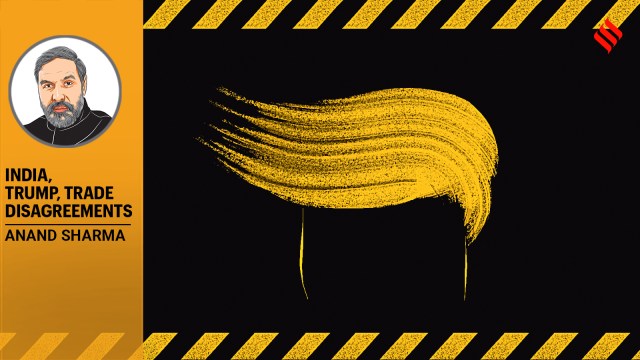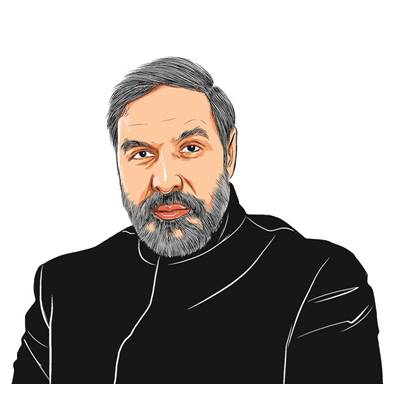Opinion Work out a deal with the US that protects India’s national interest
Trump may soon realise that there will be no winners in the tariff war he has unleashed, only losers — including America
 Trump may soon realise that there will be no winners in the war he has unleashed, only losers — including America itself. (File)
Trump may soon realise that there will be no winners in the war he has unleashed, only losers — including America itself. (File)
The unilateral imposition of high tariffs by US President Donald Trump has unleashed a global trade war, creating unprecedented disruption and turmoil in the world markets. There are fears of recession or stagflation. The move will undoubtedly hurt industry, kill jobs and inflict enormous suffering on the poor and the vulnerable.
The US will not benefit from this disruption. Nor can it insulate itself from the fallout — the world we live in is interconnected and interdependent. A fundamental truth of trade is that no country imports what it does not need and no country can export what it does not produce.
In the past few decades, the manufacturing landscape has changed significantly. The use of information technology and the internet brought about a paradigm shift and the offshoring of manufacturing created global value chains. The US and Europe have been major beneficiaries. Punitive tariffs will hurt American consumers and industry, too, will suffer from increased tariffs on components and higher input costs. The multilateral world economic order is under siege and the rules-based trading system is under assault.
Trump has made no secret of his disdain for multilateral institutions, and the agreed principles and rules that embody it. Even the most vulnerable LDCs (least developed countries) — Laos, Cambodia, Myanmar, Madagascar and Lesotho — have not been spared. The arbitrary imposition of punitive tariffs on a large number of countries, both developed and developing, has no justification.
Reciprocal tariffs have not been part of the global trade lexicon. Nobel laureates Paul Krugman and Joseph Stiglitz, among many economists, have described these as bereft of any logic and likely to hurt US interests deeply, creating upheavals in supply chains across the world and reducing global growth.
Reciprocity can only be among equals. Countries across continents are at different stages of economic growth and development. Asymmetry is a reality that can not be wished away. Developing and poor countries cannot be equated with rich, developed countries. Rising inequality resulting in social tensions and conflict is a global concern.
Less-than-full reciprocity (LTFR) between developing and developed countries is the accepted norm. It was firmly established in the Uruguay Round of negotiations leading to the establishment of the WTO. It is intrinsic to all trade negotiations. LTFR was accepted in both agriculture and NAMA (non-agriculture market access) in the Doha Round of negotiations. Trump’s actions violate this principle.
Rationality and reasonableness must remain the guiding criteria of a fair trade arrangement. The US demanding reciprocity from India lacks both. The US has a GDP of about $28 trillion, a population of about 340 million and a per capita income of about $80,000, as compared to India’s GDP of just around $4 trillion and population of about 1.4 billion, with a per capita income of about $2,400. Therefore, the reciprocal tariffs are unjustified. India should reject them outright.
India’s response to the US need not be a knee-jerk one. The two countries have a special, strategic relationship. The US is also India’s largest trading partner. It is, therefore, important for them to work together and sincerely strive to reach an understanding that expands and consolidates the economic relationship. The proposed India-US bilateral trade agreement (BTA) should be a fair and balanced one that embraces the interests of both. It cannot be limited to one-way tariff concessions by India. Trump cannot offer any tariff reductions without Congressional approval. But he can raise tariffs by exercising his executive powers. Thus, the BTA is likely to be largely, if not completely, one-sided.
US demands on the agriculture, poultry and dairy sectors are aggressive and unreasonable. It is an imperative for India to safeguard the interests of Indian farmers and its right to food security. More than 85 per cent of Indian farmers are subsistence farmers with land holdings of less than one and a half acres. In contrast, American farmers have large land holdings with massive income support from the government. These are not included as subsidies under the WTO. India had fought hard to defend its right to procure and stockpile food grains for food security at the ninth WTO ministerial in Bali in 2013. That cannot be compromised. The poultry and dairy sectors are also important, involving the livelihood concerns of millions of farmers. India’s negotiators should convey these to their US interlocutors.
A trade agreement will only be meaningful when it also includes a robust chapter on services with guarantees on visas and the mobility of Indian IT professionals. It is noteworthy that trade in services has been completely left out of the discourse. If India is to balance the agreement and find new openings for itself, services need to be included.
most read
India must protect its national interest and not succumb to Trump’s pressure. By compromising on its WTO obligations, India could lose a certain amount of its hard-earned goodwill among the developing countries in the WTO and its stature as the voice of the Global South.
The world we live in is a multipolar one. In the backdrop of disruption and chaos, it is important for India to remain focused and put in place a well-thought-out strategy to reinvigorate its engagement with all trading partners across continents. Trump may soon realise that there will be no winners in the war he has unleashed, only losers — including America itself.
The writer is a former Union cabinet minister for commerce and industry





